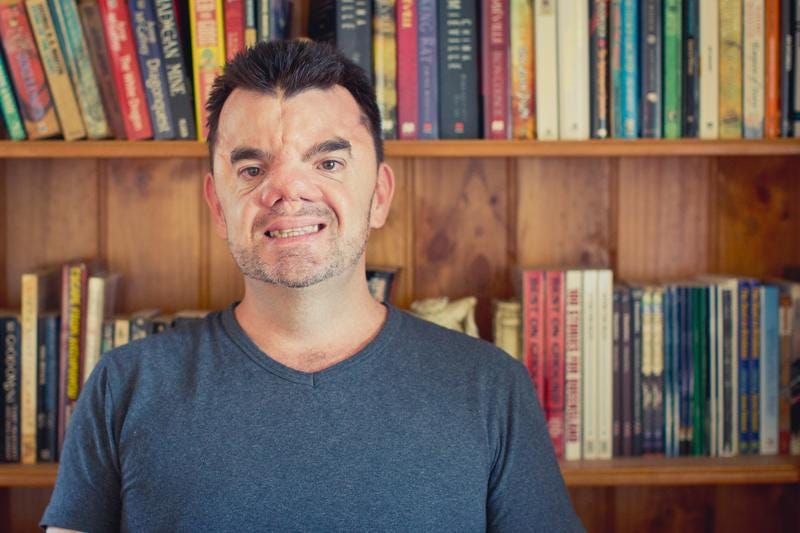The Profile Dossier: Robert Hoge, the 'Ugly' Human Living a Beautiful Life
"Everyone's uglier than they think. Everyone's more beautiful than they think, too."
When Robert Hoge was born, the first thing his mom Mary asked the doctors was: "Is my baby okay?"
He wasn't. Hoge, Mary's fifth child, was born with a tumor in the middle of his face and two severely mangled legs. Doctors suspected an anti-depressant she took when she was pregnant might have caused Hoge's birth defects. Mary refused to take her baby home because she was worried about how his difficult upbringing would affect her other children.
In her diary, she wrote: "I wished he would go away or die or something. I just wanted to be finished with it all. I told the hospital staff I didn't want my baby. I wouldn't under any circumstances take it home. I didn't feel anything for this baby. I had shut off completely. I had made up my mind I was not taking him home."
When she and her husband returned home without their newborn child, Mary kept second-guessing her decision. So she decided to give her kids a say. During a family meeting around the dinner table, she asked them to take a vote on whether they wanted Hoge to join the family. "My brothers and sisters, one after the other, all voted that I should come home," he says.

Even though he got a chance at life, it wasn't easy. He spent the majority of his childhood at hospitals where doctors attempted surgery after surgery to remove the tumor. The procedures left Hoge with severe deformities on his face.
In school, he was taunted with a roster of nicknames like, "toothpick legs," "transformer," "Pinocchio," "toe nose," "stumpy," and "Jake the Pig."
"Those were the sorts of things that stopped me from being comfortable with my face," Hoge says. "Those were the things that stopped me from owning my face. It’s hard to sort of deal with pimples and bad haircuts when you look so different from everyone else."
At age 14, Hoge's parents began talking to doctors about yet another major operation that would fill in the dents on the side of his head, reconstruct his nose (again), and bring his eyes a little closer together. The biggest risk? There was one in a four chance he might become permanently blind. So his parents said, "You're almost an adult. We'll let you make this decision."
For the first time since his birth, the fate of his face was in Hoge's own hands. He struggled with the decision until he heard his brother say, “What use is it being pretty if he can’t even see himself?”
He declined the surgery, and from that day on, Hoge has focused on accepting his imperfections, differences, and all the "ugly" things that made him who he is.
"My ugliness is a big part of who I am," he says. "If you try to separate me from my scars before even engaging me in a discussion about the issue, I may as well have never existed in the first place."
Despite everything he's been through, Hoge has led a beautifully remarkable life. He was the first person in his family to go to college. He became a journalist and then the spokesperson for an Australian politician. He carried the Olympic Torch before the Summer Games in Sydney. He’s been married, twice, and he has two daughters.
Beauty, Hoge says, is a million points on a map. It's subjective.
"Beauty is a contested space. Notions of what is or isn’t beautiful are constantly changing," he says. "Beauty isn’t the end point of a treasure map; it’s actually a million different destinations, with a million different ways of getting there."
READ.
On the label of 'ugly:' In his moving memoir, Hoge re-claims and re-frames the word he had been called his entire life: "ugly." He acknowledges the role that appearance plays in society, and how it can often become the central theme of our lives. But what if it doesn't have to? What if looking different can be remarkable in and of itself? The book is "the story of an extraordinary person living an ordinary life, which is perhaps his greatest achievement of all."
On normalizing disability: When he became a father, Hoge began to understand how open kids are to difference right from the start. "It’s actually really easy for them to incorporate difference and diversity in their worldview if that exists right from the start and isn’t hidden or treated as precious," he says.
LISTEN.
On growing up 'ugly:' What do you do when the way you look forces you to confront that every day? And even if you can get past it — what about the rest of us? In this podcast episode, Hoge explains how the day his life transformed was the day he said no to any more surgeries. As the interviewer notes: "Most of us are caught in this sort of uncanny valley. We look fine but we’re convinced that a few little tweaks could totally transform our lives. Robert gave up on tweaks and he transformed his life anyway." It's a must-listen.
WATCH.
On his remarkable life: This mini-documentary delves into Hoge's experience and how he navigates the challenges of his daily life. It features interviews, videos, and photos of him as an 11-year-old child. As an adult, he reflects on the taunts of his classmates, saying: "Kids were getting a sense that they could try to attack me on my disability and because of my facial deformities," he says. "There were times where it upset me and made me really, really sad."
On owning your face: Who owns your face? Is it you or is it Hollywood, advertisers, your peers, or your lovers? When he was 14, Hoge's parents allowed him to decide if he wanted to have a major operation done to his face. There was one in four chance that the surgery could leave him blind forever. He declined after hearing his brother say, “What use is it being pretty if he can’t even see himself?” In this powerful TED Talk, Robert examines, life, love, beauty, imperfection and pain.
On making peace with your circumstances: It wasn't up to Hoge to be born with a tumor on his face. But he was able to begin making decisions for himself only after he accepted the cards he was dealt at the beginning of his life. "If you want to live a full life, you need to accept that there are things you can't control 100%," he says. This is how he's able to live with no regrets, guilt, or spite.
TECHNIQUES TO TRY.
Stop over-thinking the past: Too many of us look back at all the possible unlived lives we could've had. When a reporter asked Hoge if he could go back in time and tell his mother not to take the anti-depressants, would he do it? His answer is a resounding no. "I have a good life. I’m happy, I’m healthy. I've got a wonderful wife, two wonderful daughters. And the other life I would have had might have been wonderful in many different ways, but it would not have been this life, and I'm pretty happy with this life," he says. Hoge has made peace with the choices of the past, and he doesn't waste time playing the anxiety-inducing game of "what if." When you fall into such a spiral, remind yourself of this Wait But Why graphic, and focus on the green lines instead of the black:
Be curious about each other's differences: By ignoring people's differences, we close ourselves off to conversations that would bring us closer together. Some of the best talks Hoge has had started with someone asking: "This might seem rude, but can I ask about your face/nose/scars/bumps?" He says, "Acknowledging someone's differences can be about saying you're not scared to talk to someone about the things that make them who they are," he says. In this polarized world we live in, genuine curiosity about one another can help us feel empathy for people who may have had different experiences from us.
Don't let societal norms define you: When Hoge declined surgery at age 14, he was making a choice on his own terms. Until that point, decisions about the fate of his face were made by parents, doctors, social workers, and society at large. By turning down the surgery, he made a decision to own his face and his future. Hoge reminds us that we make choices every day — to shave, to wear makeup, to color our hair, to pierce our body parts. Those things are tickets to the type of tribe we want to enter. But what if you decide to appreciate your appearance as it is? What if you don't look away from the mirror so quickly? "You can own your face, too. Owning is choosing," he says. "Understand all the love and the life and the pain that is part of your face, that is the art of your face."
QUOTES TO REMEMBER.
“Our faces let us look out and know others and let them know us.”
"Everyone's uglier than they think. Everyone's more beautiful than they think, too."
"We all have scars only we can own."





awesome as always
This is the story that I needed to read today! EVERYONE is MORE BEAUTIFUL than they think they are!